Pomegranate Season
How fitting that I spent peak pomegranate season in Albania. Part way through my 6-week stay by the sea, the fruits were basically falling off the trees. We would collect them to serve to the hotel guests for breakfast every day, and I would eat at least one, if not three, per day. A pomegranate for breakfast and after lunch became like medicinal supplements I incorporated into my daily routine.
One day I was picking out the little crystal seeds one by one, admiring the intricacy before popping it into my mouth, and had this epiphany about what Albania is to me — innumerable hidden gems tucked inside one humble fruit. Sweet and special to someone who has experienced its complexities. A modest but tough-skinned fruit on the outside, bursting with hidden jewels inside; overflowing with ruby-bright seeds—each one a story and a taste of something rare.
I could say this of the Balkans in general, really–I am overwhelmed with awe by all of these countries and just can’t believe I knew nothing about them before. The pomegranate itself is actually the symbol of Bosnia and Herzegovina, where I find myself now after making my way from Albania through North Macedonia and Serbia. These countries are mystical, full of a beauty I have only seen before in glossy books or on tv screens.
Still, I started and spent the most time on this journey in Albania so far, so I dive deeper with that country as my focus.
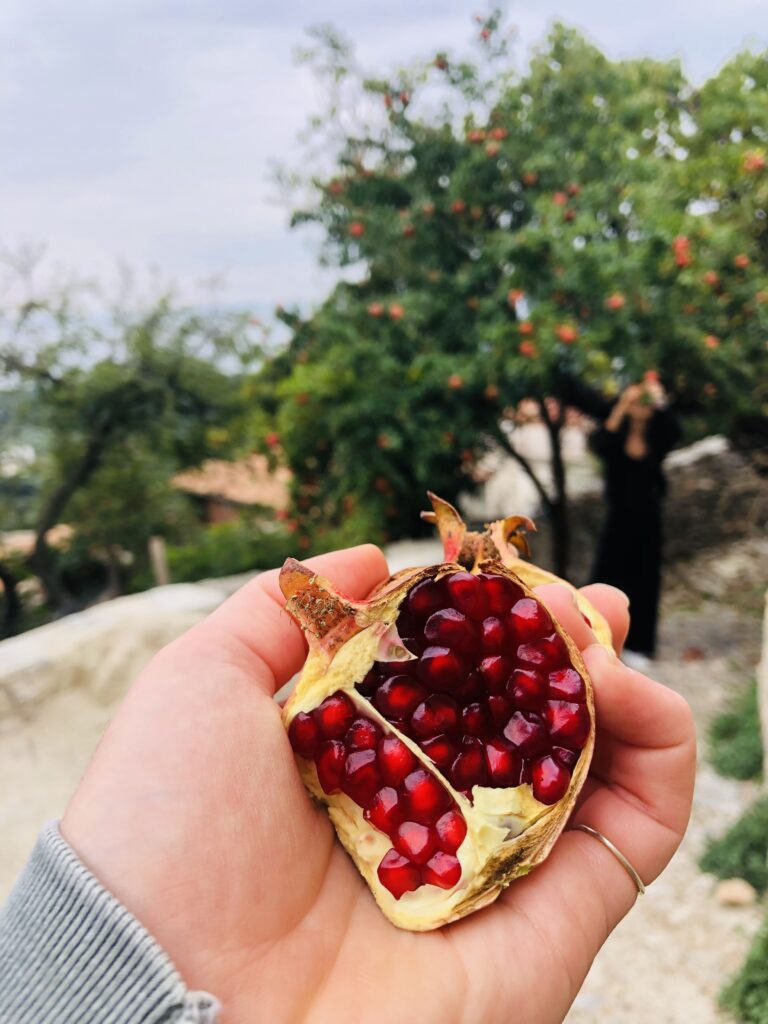
Albania’s history is marked by a long struggle for autonomy, from centuries under the Ottoman Empire to a fiercely isolated communist regime. After World War II, Albania became one of the most isolated states in the world, cutting ties even with other communist nations and enforcing strict surveillance and control over its people. The regime left the country impoverished and isolated, with deep scars on both its infrastructure and its psyche. Since the fall of communism in the early 1990s, Albania has been working to rebuild itself, gradually opening up to the world and striving for political stability and economic growth. Though the country still grapples with the legacy of its turbulent past, it’s emerging as a resilient nation, eager to reclaim its place in a rapidly changing world.
Albanian people are some of the most ambitious and hardworking I have ever met, able to now bring their skills and ideas to life in a country with unbridled potential. They continuously surprised me with their stories, both of the hardships of their predecessors in the communist time and the ways that they have seen society change since then. This big picture was important to learn about, but the bitesize stories and glimpses into everyday life were the most important to me.
When I would get a message from Artemis, who knew full well of my vegetarian diet, saying, “do you want to go for a walk to buy some meat with me?” I would accompany her to the butcher shop, certainly out of my comfort zone there, and then we’d make our way back so she could cook, usually taking a long time because we’d always run into people to greet. I would say hello and then just stand there smiling, attempting to recognize words as they chatted in Greek.
When I’d see Petros tying his boat back up after an excursion and wave from the shore. When I’d walk into my little home after work and Niso was there sweeping the floor listening to traditional Albanian music, and she’d say, “hajde, si je Victoria!”. When I ran into Jerry on the way back from a sunset walk, and then joined him to stop at the bakery where we got patatopitas and milk and took it to his rather ancient aunt in a neighborhood behind the village along skinny dirt roads.
I could keep going, describing more and more moments, each one special mostly because of how mundane they are. These are the seeds, the conglomerate of tiny ruby pieces that come together to create the whole fruit.

I feel like everyone sees my life from the outside right now and is so impressed by the crazy things I’m doing, or amazed by the wild and beautiful places I’m going. But really, my life remains pretty simple even in other parts of the world, and the things I value most about my travels are just these little daily details, and the feeling of being accepted into other peoples’ reality even as an outsider.
Allow me to drop another handful of pomegranate seeds into your palms.
My morning routine in the hotel where I worked as a volunteer: saying, “mire menjes” to the same woman every day who cleaned the sidewalks on my walk over to the hotel, having my first coffee quietly while standing at the railing of the deck, stretching my back and watching the calm blue waters before guests arrived for breakfast.
Diving into the sea off the central boat dock, sometimes for a 30 second dip, other times for a full swim.
Waving at my friend Alex 5 times a day when I walked past the bar he worked at.
Giving cafe, beach, or hike recommendations to travelers passing through Himare, since I was there long enough to collect my own stack of local insights.
Dancing for hours to latin music at my Brazilian friend’s birthday party.
Riding on the back of local people’s scooters or motos to get to new places they would show me–a sunset cliff, a beach bar further away, an olive farm.
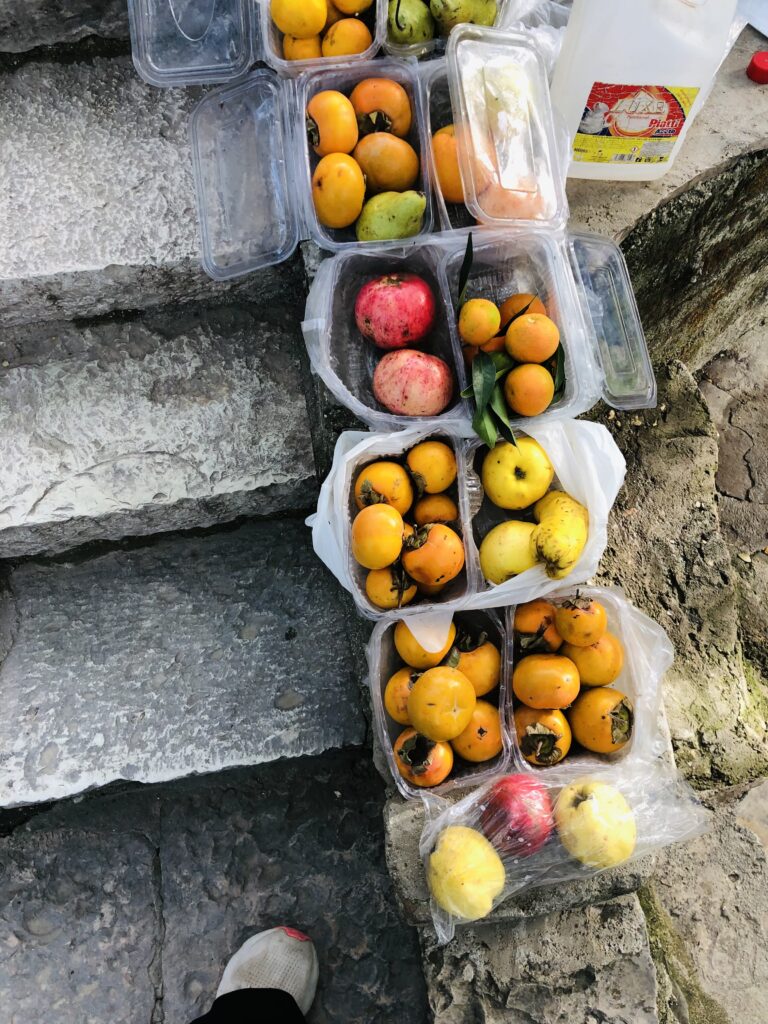
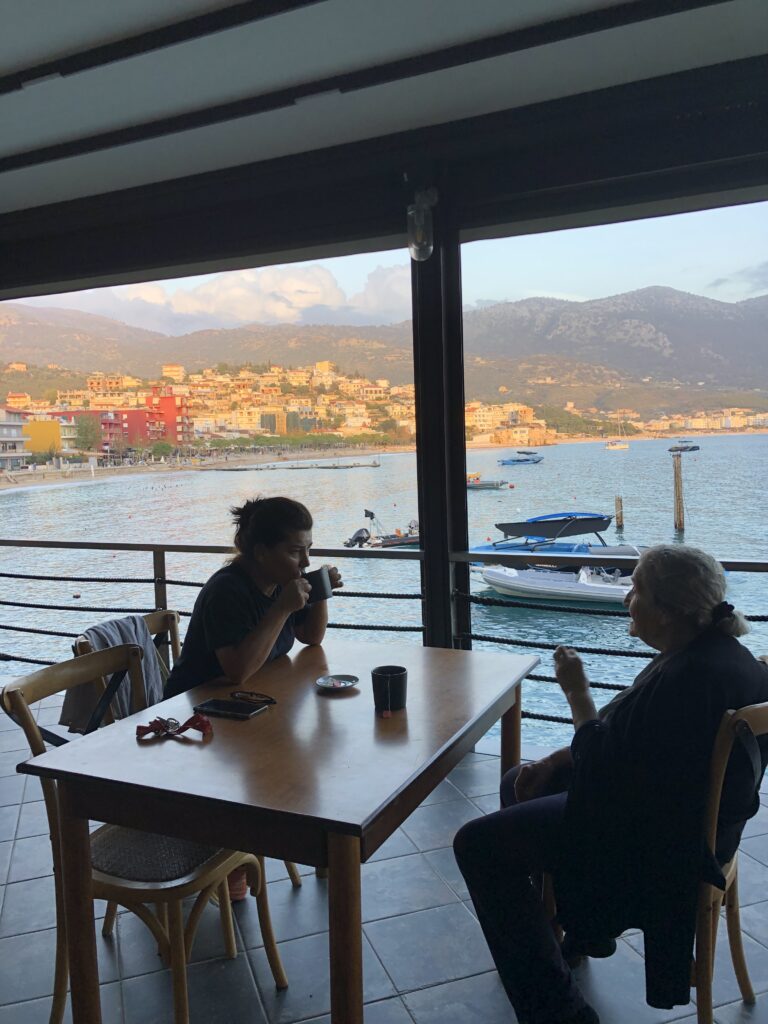
Almost getting lost in the dark, in wolf territory, descending the side of a mountain from the monastery, with my “sisters” Eleftheria and Arhiadne.
Picking flowers and wild greens with Arta, admiring her vision for her home, gardens, and restaurant and the results of her work — the first avocados on a tree she planted 14 years ago, the new batch of homemade jam from the quince fruit, the way she’d just whip up a beautiful chocolate cake or greek Ravani tart to serve to guests the next morning.
Hearing Arta and Nestoras speak so lovingly to their precious baby boy, Spiros, to see his smiling eyes, and witness him every day get closer and closer to walking on his own.
Laughing with my fellow volunteers, first Nina and then Cami, about nonsensical things and naming stray animals with the only Albanian words we knew — “Dollap” (“Closet”) the donkey, “Ulliri” (“Olive”) the cat, “Chanta” (“bag”) another cat, etc etc.
Sky and I boiling water for tea with a camp stove on the beach and breaking open shelled walnuts with rocks, putting in a lot of hard work for our snacks.
Walking aimlessly along cobblestone streets in various hillside villages like Dhermi and Vuna — an afternoon activity of its own.
Doing yoga on the abandoned deck of an old building on the path to Livadhi Beach.
Nearly daily visits with my sweet stray puppies at Pothami Beach.
Plucking a persimmon and of course, a pomegranate, from the trees to savor before or after work (or both) .
I could go on, in fact it’s taking a lot of effort not to go on — I could reflect on enough snippets like these to rival the amount of seeds in a pomegranate and trust me, there are a lot of them.
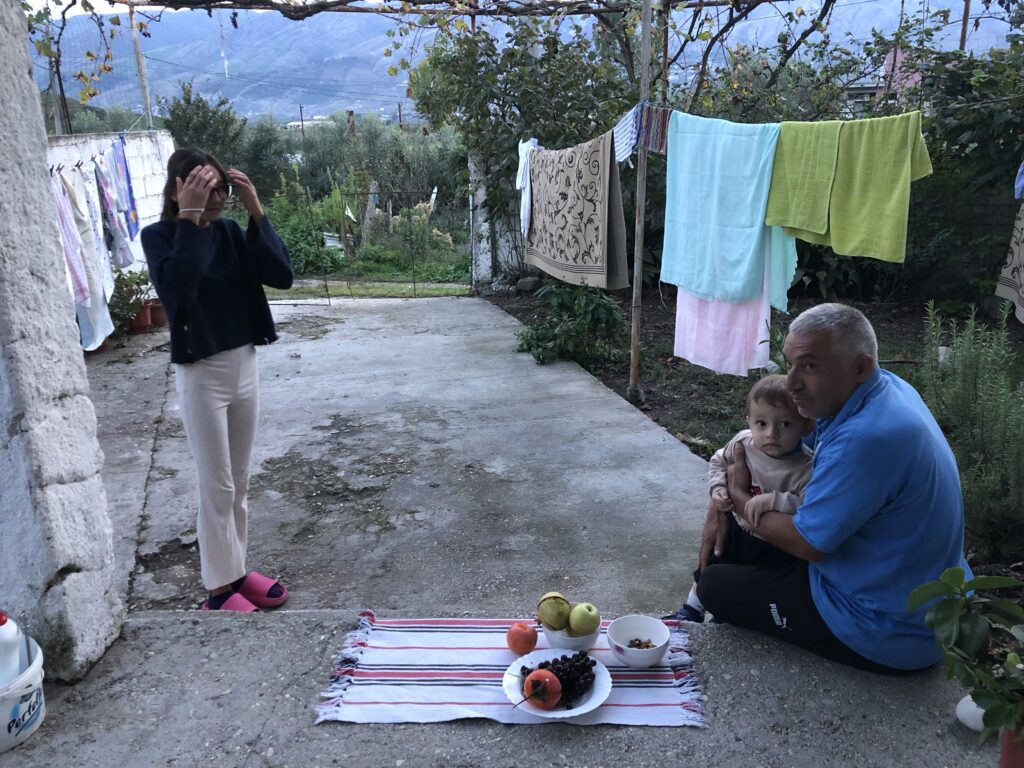
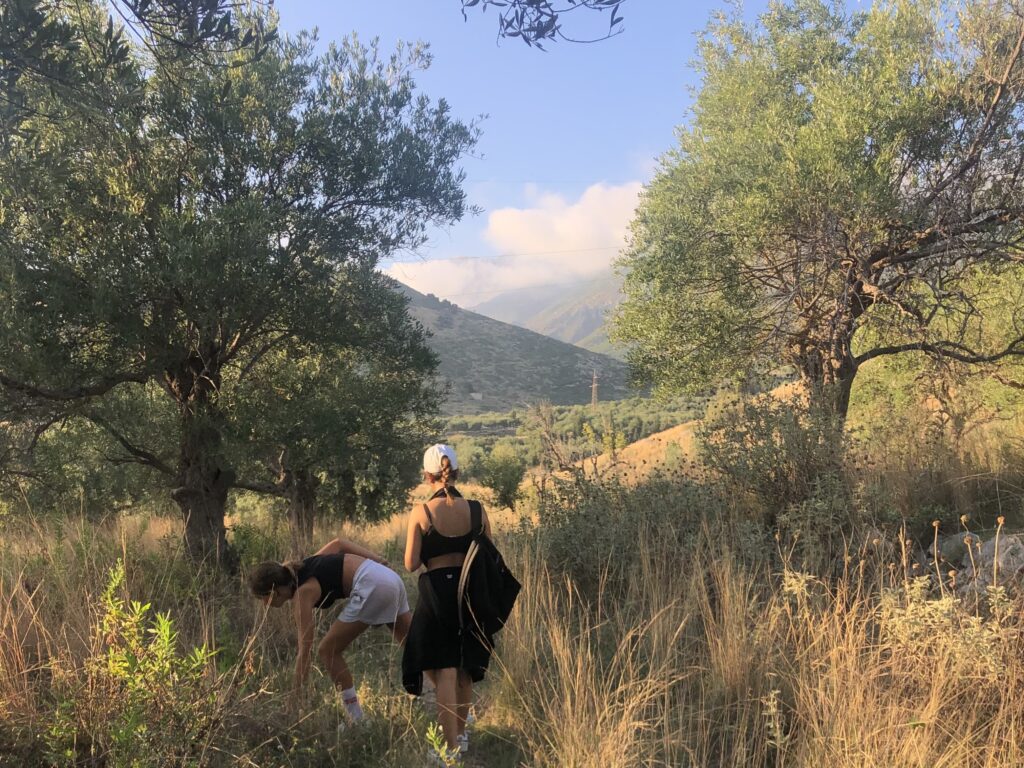
But I think you get the idea. There is deep, rich beauty to be uncovered in such simplicity, even though the very thing I’m describing as “simple” is still so utterly complex. Think about it: the design and intricate arrangement of the fruit. It’s not like just peeling open an orange in ten neat wedges. If I were to give you all the seeds from one pomegranate, I think we can agree that neither of us would ever be able to fit them all back inside the fruit in the same pattern they started in. Its original perfection is impossible to recreate.
That brings me to another thing I’m realizing about my experiences — in Albania, or anywhere else really — I can hold onto them in photographs and lines scrawled on a page to the best of my ability, but I will never be able to recreate or capture again the actual lived moments. That, too, is what makes them all the more sweet. The flavor is fleeting; it is wonderful and often transcendent, but no matter how hard I try, I can never truly remember that flavor — it’s a sensory experience, ephemeral, not meant to be held onto for longer than its own time. The best I can do is be grateful, remember what I am able to, and share it when I can.
I know, too, that the seasons change. So cheers to pomegranate season in the Balkans. At this moment in Mostar, Bosnia and Herzegovina, I am no longer picking my own fruits from the branches, instead walking the streets past vendors of fresh pressed juice and crates of the fruits they’ve harvested, keeping up with the plentiful harvest. Soon though, the season will be over. The vendors will move on to sell another product, and I will have to accept that I’ve had my fill of this one.
So, I offer a great big thank you to this fruitful season, to Albania, to Himare, to my friends, to the sea and the mountains, and to the creator of all of it. I continue to cherish the memories as more and more are created–all these glimmering seeds to savor.
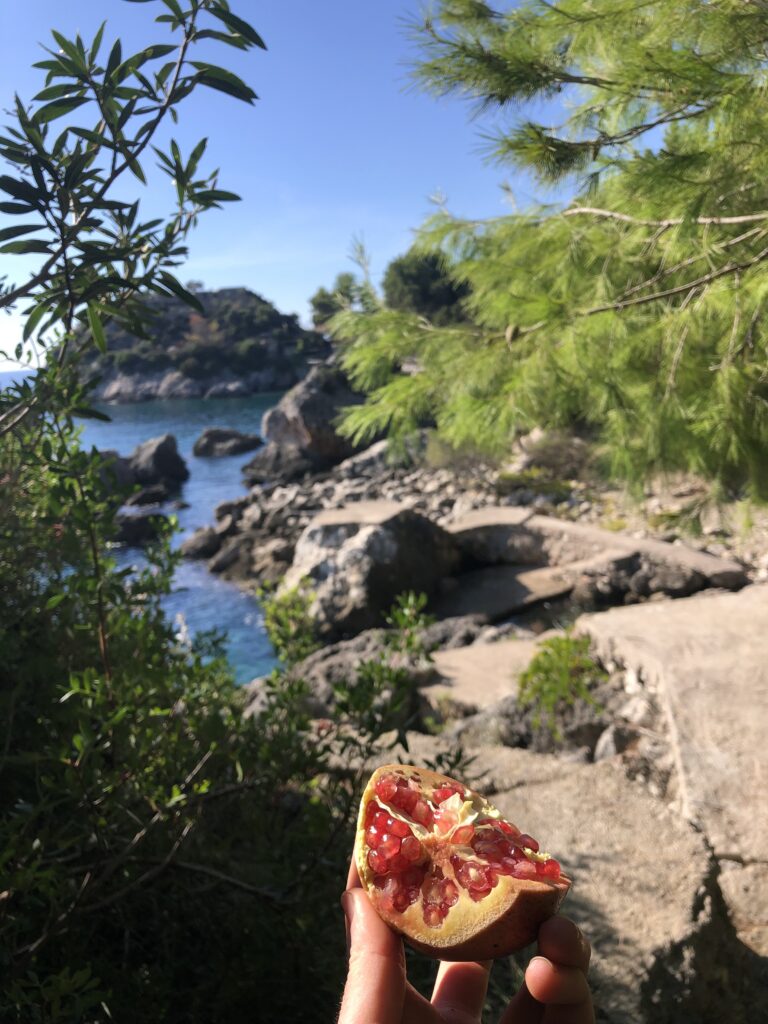
![Vignettes by V [and other miscellany] logo](https://vignettesbyv.com/wp-content/uploads/2024/04/C96F28F1-618C-41EB-832A-E04D4A6EC68D.png)
![Vignettes by V [and other miscellany] logo](https://vignettesbyv.com/wp-content/uploads/2024/04/C96F28F1-618C-41EB-832A-E04D4A6EC68D-300x300.png)